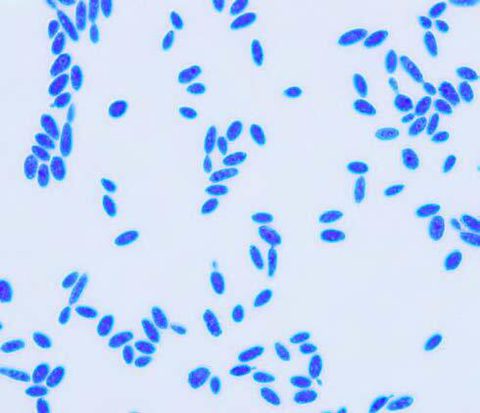

Introducing a New Expression Host – Yarrowia lipolytica
Expression strain developments increase Biocatalysts' enzyme development and manufacture service offering
Introducing a NEW Expression Host to Biocatalysts – Yarrowia lipolytica to produce recombinant enzymes such as Phospholipase A2
APPLICATION
We were looking for an additional yeast host to Pichia pastoris that would be highly versatile and would provide higher yields of recombinant enzymes increasing our capability offering.
CHALLENGE
To identify and develop the processes required to add a new yeast host that would provide us with the most flexibility and complement our current range of expression hosts. Thereby increasing our capability to develop and manufacture a larger range of enzymes.
A key parameter of this project was to identify a yeast expression system that could produce recombinant phospholipase A2 enzyme (rPLA2) at commercial scale. (PLA2 has specificity to cleave the fatty acids in position 2 of the phospholipids of the glycerol molecule.)
APPROACH
Biocatalysts Ltd have over 35 years’ experience in manufacturing enzymes and understands how the specific chemistry of an enzyme can affect the expression in a particular host. From this knowledge we put a specific set of parameters together to identify the best possible yeast expression host to produce rPLA2 these included a yeast strain that:
- Was QPS (Qualified Presumption of Safety)
- Could be produced using a simple fermentation process
- Expressed high yields of complex glycosylated proteins
- Required low complexity of downstream processing to obtain the product
From this list of criteria, we identified Yarrowia lipolytica as a potential candidate. To understand how best to work with this organism we collaborated with Dr Jean-Marc Nicaud and his team at the INRAE (INSTITUT NATIONAL DE RECHERCHE POUR L’AGRICULTURE, L’ALIMENTATION ET L’ENVIRONNEMENT or National Research Institute for Agriculture, Food and Environment, Jouy-en-Josas, France), who are specialists in the use of Yarrowia lipolytica as a yeast platform for production of protein.
We developed a set of protocols comparing the yield and activity of PLA2 from Pichia pastoris and Yarrowia lipolytica in 3L shake flasks. The concluding data showed that there was a higher yield and activity with Yarrowia compared to Pichia. Yarrowia’s simpler fermentation process also meant there was an additional cost and time saving benefit, which was an important factor in the choice of developing this organism. Once this data was verified, we moved forward with the scale up, this involved optimising the process to maximise the yield at 50L through 500L and up to 18m3. During this scale up phase we ensured that the production process was fully compliant with all relevant regulation including food safety and quality; ensuring the rPLA2 we produced will be Kosher and Halal approved.
OUTCOME
The successful completion of this project has provided Biocatalysts Ltd with a NEW yeast host Yarrowia lipolytica that is capable of producing enzymes at commercial scale, as demonstrated with the production of a recombinant PLA2 enzyme Lipomod™ 833L2.
L833L2 is a lipase enzyme with specificity to cleave the fatty acids in position 2 of the phospholipids of the glycerol molecule. It is both Kosher and Halal compliant and can be used to improve the emulsifying properties such as egg yolk and make the emulsion produced from them more stable.
BENEFITS
Having 2 different yeast expression systems in our range of expression hosts increases our flexibility and offers more choice when evaluating the enzymes’ expression.
When selecting the expression host, we consider several parameters to ensure we choose the best performing host for a particular protein.
- What is the Enzyme source?
- Which Enzyme activity is required?
- Time
- Cost
- Regulatory considerations
- Downstream processing requirements
- Specific requests by a customer
Expanding our range of expression hosts ultimately increases our capability to express a wider range of enzyme which leads to a greater success in developing novel products for our customers.
At Biocatalysts Ltd we are always looking for ways to improve our service and offering; this case study highlights our commitment to passing on these technological improvements to our customers.